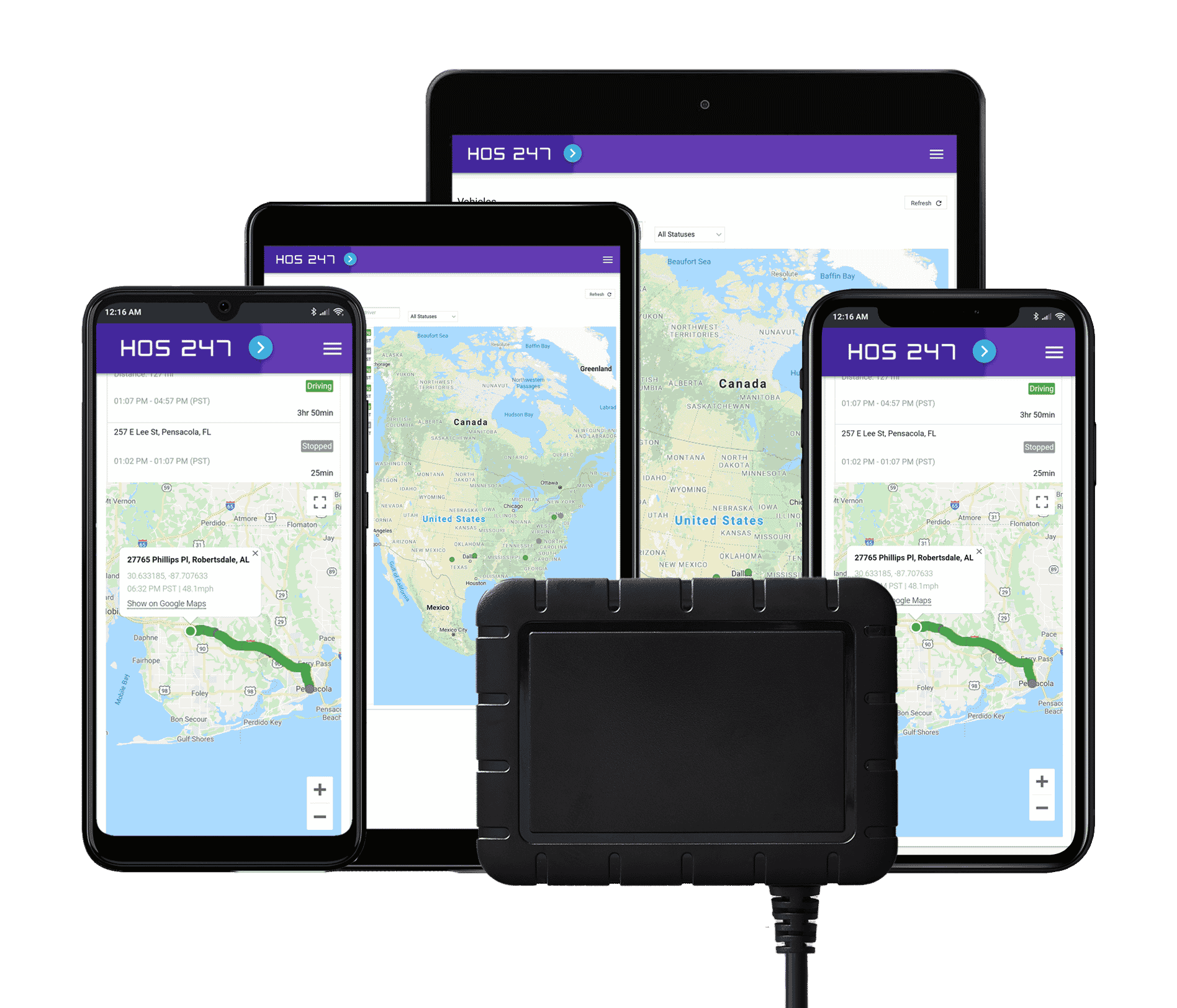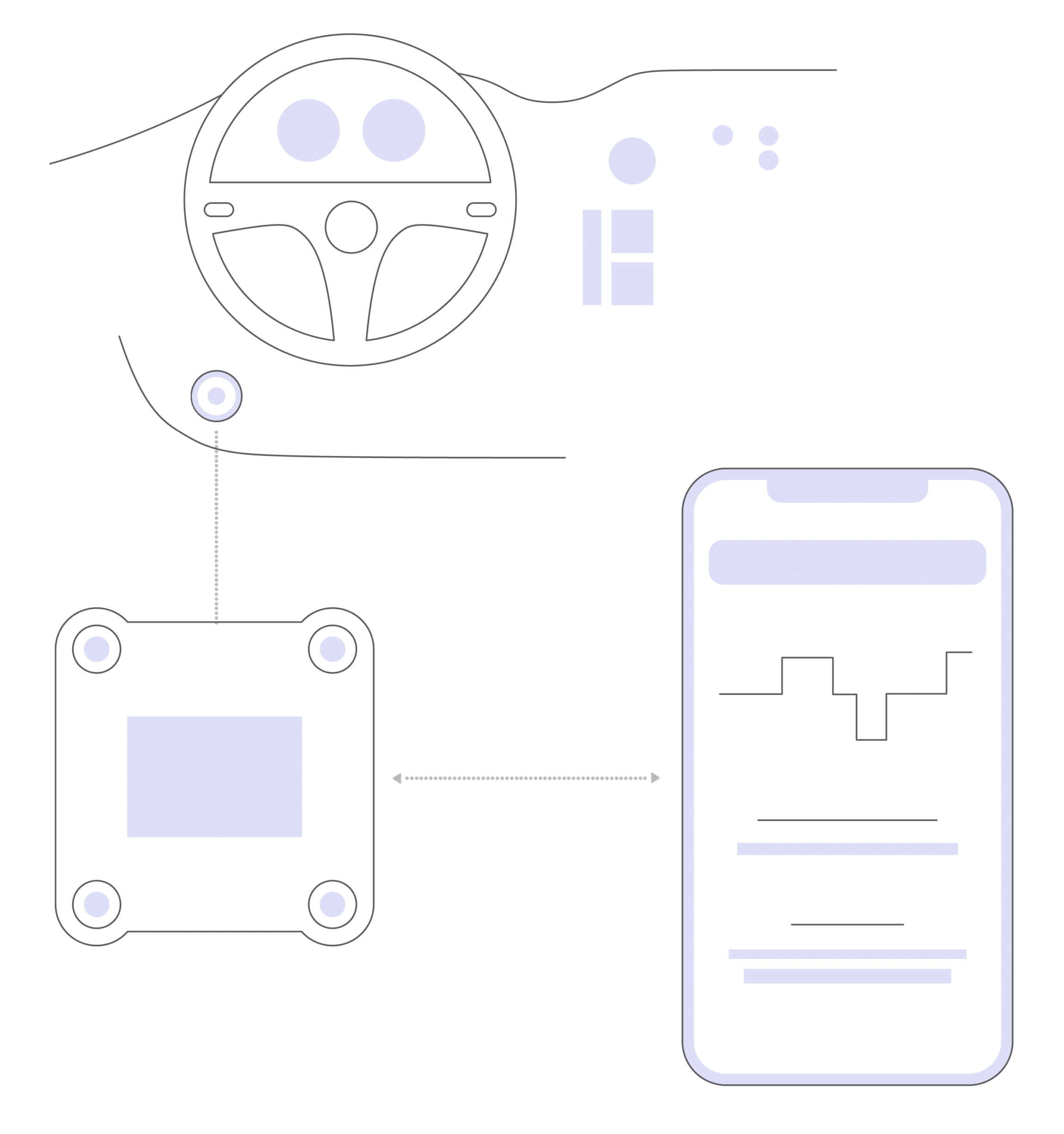The ability to monitor vehicles in real time is a major benefit to fleet managers. When able to view location data, speed, a driver’s idle time and more, fleet managers can make real-time decisions that benefit the business as a whole. Commercial truck tracking devices (also called GPS trackers or automatic vehicle locators) aren’t all the same, however. Some GPS providers are more experienced with the needs of trucking fleets than others. HOS247 is a leader in the industry and offers commercial fleet GPS tracking solutions that can directly impact the bottom line of all trucking operations that utilize them.
What Is a GPS Tracker?
GPS trackers are devices that are easily installed in a vehicle to collect data, including location coordinates, via what’s called the Global Positioning System. Trackers can be either “plug and play,” requiring easy installation without professional assistance, or hardwired to a truck’s OBD2 port to prevent the risk of being tampered with. HOS247 offers both types of GPS tracking devices.
The data collected by a GPS tracker is of no use, however, unless it can be viewed by fleet managers. For that purpose, GPS devices need to be connected to the internet so the data can be transmitted to GPS fleet tracking servers and viewable on a website or app where fleet managers can view, organize, download and share the data.
However, even when not connected to the GPS fleet tracking server, vehicle data (such as current location and past location) is always accessible to fleet managers — even when the vehicle’s driver is off duty. This is because vehicle data is tracked separately from driver data.
Do you have any questions? Talk to ELD Advisor: 650-405-3372 or Request Callback
Who Is GPS Fleet Tracking For?
Whether a small business with a handful of commercial motor vehicles or a large trucking business, organizations of all sizes can benefit from commercial truck GPS tracking. Some specific industries that have benefited from commercial truck tracking devices include:
- Passenger transport
- Food and beverage delivery
- Retail
- Construction
- Plumbing
- Landscaping
- Waste management
- Public safety
It isn’t just vehicle management that GPS tracking helps with. The technology is beneficial for any business that has equipment to keep track of and manage.

Benefits of HOS247 4G GPS Tracking Devices for Commercial Trucks
Decisions regarding which truck to dispatch, which drivers to assign to which route and what delivery time to promise customers are a daily part of managing a trucking operation. Since much of those decisions rely on real-time information, commercial fleet GPS tracking can provide countless benefits. Some of the most commonly recognized benefits include:
- Cost savings. Knowing which route is most efficient for a driver saves money on fuel. Also, when a driver knows their vehicle’s location is being tracked, they’re far less likely to use the vehicle for unapproved personal errands, which reduces wear and tear on the vehicle as well.
- Security. If a vehicle is stolen, it can easily be recovered with an accurate GPS location.
- Driver safety. If a driver gets lost, gets into an accident or is in an area facing adverse weather, fleet managers can more easily assist them since they have the driver’s real-time location.
- Flexibility. Fleet managers and dispatchers don’t need to be in their office in order to access driver information. The portal is accessible anywhere there is an internet connection, allowing management staff to work from anywhere that has an internet connection.
- Efficient maintenance. It’s much easier to schedule vehicle maintenance when the miles driven and hours of operation are automatically recorded. This ease of scheduling also frees up time for employees to do other types of work.
- Modern 4G capabilities. 4G GPS tracking devices for commercial trucks ensure data is transferred more quickly, making the operation of the business more efficient overall.
These are just a few of the many benefits a reliable GPS truck tracking solution can offer for fleets.

Gain Full Control Over Your Fleet Management by Utilizing a New Generation Commercial Truck GPS Tracking System
Businesses that choose commercial truck tracking devices for their fleets are often surprised by how, even though they purchased the devices to keep track of their assets, they’ve actually been able to gain more control over their entire fleet and manage it more effectively. As such, they’re also enhancing their efficiency and saving money.
Manage Drivers’ Speed
When a driver speeds, they cost the organization more money in fuel costs. The same is true when they idle excessively. A commercial fleet GPS tracking system, however, alerts fleet managers when their drivers are speeding or idling. Managers can then address these types of driver concerns in real time to prevent them from happening again.
Boost Security
If a truck is stolen, a GPS truck tracking solution can help owners quickly recover their assets. But since fleet managers will already know where vehicles are located at any given time, this knowledge also helps prevent theft from occurring altogether, as they can take action and investigate if they receive an alert that a vehicle is being used off-hours or in an unapproved area.
Additionally, GPS truck tracking devices boost driver security and safety, as they alert the driver and owner of any required maintenance. Trucks that don’t receive scheduled maintenance risk breakdowns, accidents, noncompliance with safety guidelines and hefty repair costs.
Provide High-Quality Customer Service
When dispatchers know the exact location of their drivers and vehicles, they can more quickly match the right driver to the right job. Additionally, should a customer call with a request for a driver en route, a dispatcher can quickly contact the driver with any last-minute requests, thus better satisfying the customer’s needs. It also helps provide proof of services rendered.
Use Active Vehicle Tracking to Generate Accurate Reports
Unlike passive GPS tracking, which requires manual downloading of information when vehicles return to their home base, active GPS tracking provides real-time access to vehicle information. This real-time information helps management make on-demand decisions to better manage their fleet.
Additionally, it allows for seamless automation of reports both on-demand and on a scheduled basis. Fleet managers can compare the performance of two drivers, for example, using real-time data that helps inform decision-making.

Gain Full Control Over Your Fleet Management by Utilizing a New Generation Commercial Truck GPS Tracking System
Businesses that choose commercial truck tracking devices for their fleets are often surprised by how, even though they purchased the devices to keep track of their assets, they’ve actually been able to gain more control over their entire fleet and manage it more effectively. As such, they’re also enhancing their efficiency and saving money.
Manage Drivers’ Speed
When a driver speeds, they cost the organization more money in fuel costs. The same is true when they idle excessively. A commercial fleet GPS tracking system, however, alerts fleet managers when their drivers are speeding or idling. Managers can then address these types of driver concerns in real time to prevent them from happening again.
Boost Security
If a truck is stolen, a GPS truck tracking solution can help owners quickly recover their assets. But since fleet managers will already know where vehicles are located at any given time, this knowledge also helps prevent theft from occurring altogether, as they can take action and investigate if they receive an alert that a vehicle is being used off-hours or in an unapproved area.
Additionally, GPS truck tracking devices boost driver security and safety, as they alert the driver and owner of any required maintenance. Trucks that don’t receive scheduled maintenance risk breakdowns, accidents, noncompliance with safety guidelines and hefty repair costs.
Provide High-Quality Customer Service
When dispatchers know the exact location of their drivers and vehicles, they can more quickly match the right driver to the right job. Additionally, should a customer call with a request for a driver en route, a dispatcher can quickly contact the driver with any last-minute requests, thus better satisfying the customer’s needs. It also helps provide proof of services rendered.
Use Active Vehicle Tracking to Generate Accurate Reports
Unlike passive GPS tracking, which requires manual downloading of information when vehicles return to their home base, active GPS tracking provides real-time access to vehicle information. This real-time information helps management make on-demand decisions to better manage their fleet.
Additionally, it allows for seamless automation of reports both on-demand and on a scheduled basis. Fleet managers can compare the performance of two drivers, for example, using real-time data that helps inform decision-making.
What Other Features Are Needed for Your Trucking Operations in Addition to Fleet GPS Tracking?
While GPS truck tracking devices certainly boost the efficiency of a trucking operation and help impact the bottom line, there are other features that fleet managers should look for when considering a comprehensive solution from a trusted GPS provider.
ELD
Electronic logging devices (ELDs), when paired with a reliable app, are required for most fleets today as a replacement for traditional paper logbooks. Essentially, an ELD connects to a vehicle’s diagnostic port and then transmits acquired information to the app and to the fleet operators, helping fleets and drivers stay compliant with hours of service (HOS) regulations and more.
IFTA Mileage Reporting
In addition to its GPS truck tracking devices, HOS247 can also calculate the amount of fuel that is purchased by drivers, and by jurisdiction, while also automatically calculating the distance that’s traveled by a vehicle. The seamless automation of otherwise complex calculations by HOS247 devices makes fleet management much easier, cutting down on time-consuming administrative duties and reducing the risk of error immensely.
Vehicle Maintenance
Comprehensive fleet management solutions offer preventive maintenance scheduling based on mileage, engine hours, or calendar intervals. These systems track maintenance history, send service reminders, and help prevent costly breakdowns by ensuring routine maintenance is performed on time. By implementing automated maintenance tracking, fleet managers can extend vehicle lifespan, reduce repair costs, and minimize unexpected downtime.
Fault Code Detection
Advanced GPS tracking systems include engine diagnostic capabilities that alert managers when a vehicle’s onboard computer generates fault codes. This early warning system allows maintenance issues to be addressed before they escalate into major repairs or roadside breakdowns. Real-time fault code notifications enable proactive maintenance decisions, reducing costly emergency repairs and tow services.
Idling Monitoring
Excessive idling significantly impacts fuel consumption and engine wear. Modern tracking solutions monitor idling time and patterns, providing managers with actionable data to reduce unnecessary idling. By identifying and addressing excessive idling, fleets can substantially reduce fuel costs, decrease emissions, and extend engine life. Some systems even allow for setting idling thresholds with automatic alerts when exceeded.
Integrating these advanced features with GPS tracking creates a comprehensive fleet management solution that goes beyond simply knowing where vehicles are located. By selecting a solution that combines these critical functions, fleet managers can transform their operations from reactive to proactive, improving compliance, reducing costs, extending vehicle lifespans, and strengthening their bottom line.

Types of Commercial Truck Tracking Devices
For trucking operations looking to enhance efficiency and compliance, selecting the right tracking technology is crucial. Different tracking devices offer unique advantages depending on installation requirements, functionality, and specific operational needs.
Plug-and-play GPS trackers connect directly to a truck’s OBD-II port, offering immediate functionality without technical expertise. These user-friendly devices are ideal for fleets needing quick deployment or those with vehicles that regularly rotate in and out of service. HOS247’s plug-and-play solutions combine convenience with robust features that fleet managers depend on.
Hardwired GPS tracking systems are directly connected to the vehicle’s electrical system, providing enhanced security and reliability. These tamper-resistant installations are particularly valuable for high-value assets or in situations where unauthorized device removal is a concern. While professional installation is typically required, the added security and dependability often justify this initial investment.
Asset trackers address the unique challenges of monitoring trailers, containers, and non-powered equipment. With extended battery life and weather-resistant designs, these specialized units ensure complete visibility across all fleet assets, powered and non-powered alike.
4G/5G compatible devices represent essential technology as 3G networks have been phased out. These modern trackers ensure uninterrupted data transmission while positioning fleets for future technology standards. HOS247’s 4G devices provide the reliability today’s operations demand with the forward compatibility tomorrow’s technology will require.
Integrated ELD/GPS solutions combine electronic logging functionality with tracking capabilities in a single system. This integration streamlines driver workflows while providing fleet managers with comprehensive oversight. By addressing both compliance requirements and operational visibility through one platform, these solutions reduce dashboard clutter and simplify technology management.
Understanding these options allows fleet managers to select tracking technology that aligns with their specific operational requirements, compliance needs, and management priorities.

How to Choose a GPS Tracking Provider
Selecting the right GPS tracking provider significantly impacts a trucking operation’s efficiency, compliance, and bottom line. With numerous options available, fleet managers should consider several critical factors when evaluating potential partners:
- Industry experience. Look for providers like HOS247 with specific trucking knowledge who understand the unique challenges and regulations facing commercial fleets.
- Hardware quality. Choose devices engineered for the demanding environments trucks operate in, minimizing maintenance issues and service interruptions.
- Software usability. Prioritize intuitive interfaces with clear data visualization that allow your team to access critical information without extensive training.
- Reporting capabilities. Ensure comprehensive reporting on driver behavior, idle time, and route efficiency with both standard and customizable options.
- Customer support. Evaluate support hours, language options (HOS247 offers English, Spanish, Russian, and Polish), and response time guarantees.
- Contract flexibility. Look for providers offering trial periods and no long-term contract requirements, demonstrating confidence in their product quality.
- Integration capabilities. Confirm compatibility with your existing software systems to prevent operational silos and duplicate data entry.
- Scalability. Select solutions that can grow alongside your business without a complete system change when your fleet expands.
By thoroughly evaluating these factors, fleet managers can select a GPS tracking provider that serves as a long-term partner in optimizing operations and maintaining compliance rather than just a technology vendor.

Truck Tracking Implementation Best Practices
Successfully implementing GPS tracking in your trucking operation requires good planning and execution. Follow these guidelines to ensure a smooth transition and maximize your investment.
Planning Your Implementation
- Start with a clear plan that includes specific goals and how you’ll measure success. Before ordering equipment, check your vehicles to identify any installation challenges. Get drivers involved early by explaining how the system will make their jobs easier – from reducing paperwork to providing protection during disputes.
- Begin with a small test group rather than your entire fleet. This allows you to fix any problems before rolling out to all vehicles.
Training Your Team
- Provide training that combines hands-on practice, written guides, and videos. Focus on showing drivers how the system helps them directly in their daily work.
- Identify drivers who quickly adapt to the technology and can help others learn. Schedule follow-up training after everyone has had some experience with the system.
Solving Common Problems
- Driver resistance. Focus on how tracking protects drivers through accurate records during customer disputes or roadside inspections.
- Rural connectivity. Choose a system that stores data when out of coverage and updates automatically when connection returns.
- Information overload. Start by focusing on just a few important metrics before expanding what you track.
HOS247 provides support throughout this process, helping you turn GPS tracking from just another requirement into a tool that improves your business efficiency and bottom line.
Understanding DOT Electronic Logs Requirements
DOT electronic logs, mandated by the Federal Motor Carrier Safety Administration, are digital systems that automatically record driving time and hours of service records. This is a federal law and violations can lead to serious fines and even being placed out of service.

What Your ELD Must Do
Your electronic logging device connects to your truck’s engine. It automatically records driving time, engine hours, vehicle miles, and location information. These four data points form the foundation of your hours of service records.
The device tracks your duty status throughout the day. It knows when you’re driving, on-duty but not driving, off-duty, or in the sleeper berth. You don’t manually enter this information — the ELD captures it automatically when your truck moves.
Technical Standards Every ELD Must Meet
First, every compliant ELD must appear on the FMCSA’s Registered Electronic Logging Devices list — a crucial requirement that ensures your device meets federal standards and will pass inspection. The FMCSA also lists specific requirements in 49 CFR Part 395, Subpart B. Here are the main ones:
- Data transfer. Your logbook must send logs to inspectors two ways — through wireless transfer or USB 2.0. When an officer asks for your logs, you need to provide them electronically.
- Tamper protection. The system flags any attempts to change or delete data. If someone tries to alter records, the ELD creates a permanent record of that attempt.
- Display requirements. Your daily log must show as a graph grid, just like paper logs used to look. Officers know this format and expect to see it during inspections.
- Data storage. The ELD keeps your current day’s log plus your previous seven days. All eight days must be available during any inspection.
- Alert system. The device warns you before you violate HOS rules. These alerts give you time to find parking before you run out of hours.
Important Connectivity Considerations
With major cellular carriers shutting down 3G networks between 2022 and 2024, older ELDs have lost connectivity. If your device relied on 3G for data transmission, it may no longer meet FMCSA requirements for electronic data transfer. Your ELD must maintain reliable connectivity through 4G, 5G, WiFi, or satellite networks to remain compliant.
This isn’t technically a new regulation, but rather an infrastructure change that affects compliance. An ELD that cannot transmit data electronically due to discontinued 3G service fails to meet the original mandate requirements.
Key Compliance Areas to Monitor
Staying informed about FMCSA rules can mean the difference between a smooth roadside inspection and costly downtime. Here are the compliance areas where drivers most often run into trouble.
Malfunction Reporting
When your ELD malfunctions, you must note it in your records and inform your carrier within 24 hours. You need to reconstruct your logs for the current day and keep paper logs until the device is fixed. The FMCSA has always required this, but enforcement has become more consistent.
Special Driving Categories
There are two special categories that must be approved by a fleet manager:
- Yard moves. Moving trucks within private property can be logged as yard moves. This time counts as on-duty not driving, preserving your available driving hours. The entire movement must occur on private property with no public road access.
- Personal conveyance. You can use your commercial vehicle for personal reasons while off-duty. This might include driving to a restaurant, hotel, or home terminal when no load is attached. Personal conveyance cannot advance a load or be used to extend your available hours. The movement must be personal in nature and you must be relieved from work.
Both categories are closely monitored during inspections, and misuse can result in violations. Enforcement officers look for signs that these statuses are being used to bypass HOS limits.
The Cost of Non-Compliance
ELD violations aren’t cheap. Fines range from $1,000 to $10,000 per violation. But money isn’t the only issue. Violations can put you out of service immediately, costing you loads and damaging your CSA score.
Multiple violations can threaten your CDL. Shippers and brokers check these records. Too many violations mean fewer load opportunities and lower rates.
Beyond Basic Compliance
Meeting minimum requirements keeps you legal. But the right ELD does more than that. Good systems handle all these technical details automatically. They stay updated with regulatory guidance and maintain reliable connectivity.
The best electronic logbooks turn compliance from a daily struggle into something that happens in the background while you drive. They provide clear alerts, simple interfaces, and reliable performance that makes inspections faster and easier.

Who Must Use Electronic DOT Logs?
Not every commercial driver needs elogs, but most do. The requirements depend on your type of operation, your vehicle, and how often you drive. Understanding where you fit helps you stay compliant and avoid purchasing equipment you don’t actually need.
Interstate Commercial Drivers
If you drive across state lines and your vehicle requires a CDL, you need an ELD. This applies to both company drivers and owner-operators. The rule covers trucks with a gross vehicle weight rating (GVWR) of 10,001 pounds or more, vehicles transporting hazardous materials that require placards, and vehicles designed to transport 9 or more passengers for compensation or 16 or more passengers not for compensation.
You must use an electronic logbook if you’re required to keep records of duty status (RODS) for more than 8 days in any 30-day period. This means if you fill out paper logs or use an ELD for 9 or more days per month, you fall under the mandate. The 8-day threshold is rolling — it doesn’t reset at the beginning of each month.
Intrastate Drivers
Intrastate requirements vary by state. Many states have adopted the federal elog rules for drivers who stay within state borders. Others have different thresholds or exemptions. Check with your state’s Department of Transportation for specific requirements, as these rules change and enforcement varies significantly.
Some states mirror federal rules exactly. Others only require ELDs for certain vehicle weights or types of cargo. A few states have longer grace periods or different hour limits that affect when you need electronic logs.
Commercial Bus Drivers
Passenger carriers face the same ELD requirements as freight haulers. If you drive a commercial bus across state lines and keep logs for more than 8 days per month, you need an electronic logging device. This includes motor coaches, charter buses, and some larger shuttle operations.
School bus drivers operating entirely within their state typically follow state-specific rules. Many are exempt due to short-haul provisions, but this depends on route length and crossing state borders.
ELD Exemptions: Are You Required to Use One?
Several exemptions exist within the ELD mandate. If you qualify for one of these exemptions, you can continue using paper logs or timecards, potentially saving money on equipment and monthly fees. However, you must be certain you qualify — claiming an exemption incorrectly leads to violations.
Short-Haul Exemption (150 Air-Mile Radius)
The most common exemption covers short-haul drivers who operate within 150 air-miles of their work reporting location. To qualify, you must start and end your day at the same location, stay within the 150 air-mile radius (approximately 172 road miles), and return to your starting point within 14 hours.
You cannot use this exemption more than 8 days in any 30-day period if you venture outside the radius or exceed the time limit. On those days, you need either paper logs or an ELD. Your employer must keep accurate time records showing your start time, end time, and total hours for each day you use this exemption.
This exemption works well for local delivery drivers, construction haulers, and regional operators with predictable routes. It doesn’t work if you occasionally take longer runs or experience regular delays that push you past 14 hours.
Pre-2000 Vehicle Exemption
Vehicles with engines manufactured in model year 1999 or older don’t need to keep elogs.. These older engines lack the electronic control modules (ECMs) that ELDs need to function properly. The model year refers to the engine, not the vehicle itself — a 2005 truck with a rebuilt 1999 engine would qualify for this exemption.
You must document your engine’s model year to claim this exemption. Keep registration papers, engine specifications, or manufacturer documentation readily available. During inspections, officers will verify your engine year, and you’ll need paper logs for these vehicles.
Driveaway-Towaway Operations
Driveaway-towaway drivers have a permanent exemption from ELD requirements. This covers operations where the vehicle being driven is the commodity being delivered, or where a vehicle is being towed by another vehicle as the commodity.
This exemption applies to dealers moving new trucks, companies repositioning rental vehicles, and towers moving damaged vehicles. The vehicle must be part of the shipment — hauling cars on a car carrier doesn’t qualify. You still need to maintain paper logs showing your hours of service.
Agricultural Exemptions
Agricultural commodities have special provisions that affect ELD requirements. Drivers transporting agricultural commodities within 150 air-miles of the source during planting and harvest seasons don’t need to log those hours. The hours don’t count against your HOS limits, though you still need logs once you exit that radius.
Each state defines its planting and harvest seasons differently. These periods typically run 3-4 months in spring and fall but vary by location and crop type. The exemption covers the transportation of crops, livestock, and farming supplies directly supporting planting or harvesting operations.
Rental Vehicle 8-Day Exemption
If you’re using a rental vehicle for 8 days or fewer in any 30-day period, you don’t need to install an ELD in that rental. This helps drivers whose regular vehicles are being repaired or who need temporary additional capacity. You can use paper logs during these rental periods.
This exemption only applies to true rentals, not lease-purchase agreements or long-term leases. The rental agreement must show the rental period, and you need to track your total rental days carefully. Once you exceed 8 days of rental use in 30 days, you need an ELD-equipped rental or a portable ELD device.
Documenting Your Exemption Status
Claiming an exemption requires proper documentation. Keep all supporting paperwork in your vehicle, including time records for short-haul operations, engine manufacturing dates for pre-2000 vehicles, bills of lading for agricultural loads showing origins and commodities, and rental agreements with clear date ranges.
During roadside inspections, you must prove you qualify for the exemption you’re claiming. Officers won’t accept verbal explanations without documentation. Missing paperwork means you’ll likely receive a violation, even if you actually qualify for the exemption.
Many carriers use ELDs even when exempt because electronic logs can be easier than managing paper and exemption documentation. The choice depends on your operation’s complexity and how often you might exceed exemption parameters.
HOS247 Is a Top-Rated Trucking Technology Provider
Finding the right GPS commercial truck tracking products involves more than just finding one that’s the most inexpensive. Instead, those in charge of making the final decision are tasked with doing their due diligence to make sure the product is easy to use, is offered by a reputable organization and has knowledgeable customer service support. Without choosing wisely, they could get stuck in a contract and end up wasting money on a product they can’t even use.
HOS247 is top-rated among trucking technology providers for a variety of reasons, including:
- Multilingual customer service available Monday through Sunday, speaking Spanish, English, Russian and Polish.
- No need to lock into long-term contracts.
- Hassle-free returns within two weeks if unsatisfied.
- Honest reviews from real users, both drivers and fleet managers, on Apple and Android app stores.
Choosing the right commercial truck GPS tracking system isn’t just about choosing a device that helps locate trucks; instead, it is about choosing a device from a partner that has years of experience and is invested in a trucking organization’s bottom line.

Conclusion
GPS tracking technology has become essential for modern trucking operations, delivering benefits that extend far beyond vehicle location monitoring. The right tracking solution transforms fleet management by optimizing routes, enhancing safety, automating reporting, and streamlining maintenance — all contributing directly to operational efficiency and profitability.
When choosing amongst commercial truck tracking devices, prioritize solutions that balance comprehensive functionality with user-friendly operation. The most successful implementations start with thoughtful planning, include thorough training, and maintain open communication throughout the process. By following the best practices outlined in this guide, fleet managers can minimize disruption while maximizing their return on investment.
In today’s competitive transportation landscape, trucking companies that effectively leverage GPS fleet tracking technology position themselves not just to meet current challenges but to capitalize on future opportunities as technology continues to evolve.

I’ve co-founded, built and managed several transportation-related businesses. Now, I’m a founder and CEO of HOS247 – an AI Transportation Platform for trucking companies, freight brokers and other logistics operations. We are transitioning old-style operations to technology-advanced logistics entities and help them to grow their businesses. ELDs (electronic logging devices), fleet tracking and management 2.0 combined with AI-powered dispatch tools.












For years, the box truck industry relied on paper logbooks to track driving hours. Today, the landscape has shifted. An ELD is a strict federal requirement for many fleets, rather than an optional accessory. An electronic logging device (ELD) is

In today’s highly competitive trucking industry, fleet managers face numerous challenges in ensuring the efficiency, safety, and profitability of their operations. One of the most effective tools for addressing these challenges is GPS fleet tracking technology. By providing real-time visibility

Electronic logging device (ELD) compliance software has become an essential part of any trucking company’s operations since the Federal Motor Carrier Safety Administration (FMCSA) mandate took effect. Investing in the best electronic logbook software can help truckers and office staff
